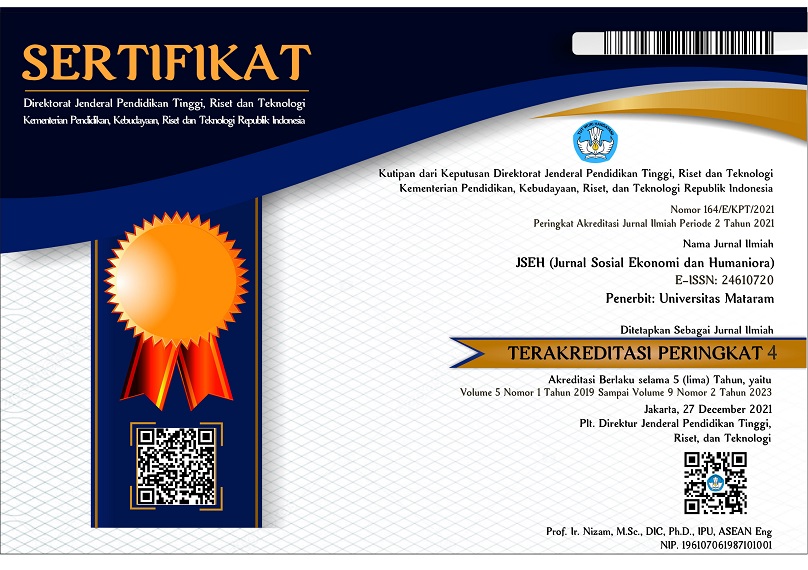Penerapan Teori A.C.T.O.R.S pada Pemberdayaan Masyarakat di Desa Wisata “Ekowisata Burai” Kecamatan Tanjung Batu Kabupaten Ogan Ilir
DOI:
https://doi.org/10.29303/jseh.v10i1.455Keywords:
Tourism Village, Ecotourism, Burai, A.C.T.O.R.S TheoryAbstract
"Burai Ecotourism Village" in South Sumatra Province, Indonesia, underwent a positive transformation through the Burai Village Tourism Program (Bu Dewi) initiated by PT Pertamina EP Asset 2 Prabumulih Field. This program successfully involves the community in village development by giving authority, increasing self-confidence, building trust, providing opportunities, handing over responsibility to the community, and providing support from various parties. This research aims to analyze community empowerment efforts in the program, using the A.C.T.O.R.S Theory by Macaulay & Cook (1997). Through descriptive qualitative research methods, this study focuses on the Tourism Village "Burai Ecotourism," Tanjung Batu District, Ogan Ilir Regency. The results of the analysis showed that Bu Dewi's program successfully involved the community in the development of the village by giving authority, increasing self-confidence and competence, building trust, providing opportunities, handing over responsibility to the community, and providing support from various parties.
References
Cook, S., & Steve, M. (1997). Pemberdayaan yang Tepat. PT. Elex Media Komputindo.
Desa, M. (2022). Potensi Ekowisata di Kampung Wisata Warna Warni Desa Burai, Sumatera Selatan. Masterplandesa.Com. [https://www.masterplandesa.com/wisata/potensi-ekowisata-di-kampung-wisata-warna-warni-desa-burai-sumatera-selatan/#:~:text=Beberapa potensi yang ditemukan di,oleh-oleh di Desa Burai](https://www.masterplandesa.com/wisata/potensi-ekowisata-di-kampung-wisata-warna-warni-desa-burai-sumatera-selatan/#:~:text=Beberapa potensi yang ditemukan di,oleh-oleh di Desa Burai).
Detmuliati, A. (2021). Analisis Potensi Ekowisata Berbasis Masyarakat di Desa Burai Sumatera Selatan. EDUTOURISM Journal Of Tourism Research, 3(01), 90–102.
Fukuyama, F. (2002). Hakikat Manusia dan Rekonstruksi Tatanan Sosial. (trans: The Great Disruption). Ed ke-2. Qalam Press.
Jaffe, E., & Pasternak, H. (2004). Developing wine trails as a tourist attraction in Israel. International Journal of Tourism Research, 6(4), 237–249.
Kemenparekraf. (2022). Desa Wisata Provinsi Sumatera Selatan. Jaringan Desa Wisata (Jadesta). https://sumsel.jadesta.com/.
Lee, C.-C., & Chang, C.-P. (2008). Tourism Development and Economic Growth: A Closer Look at Panels. Tourism Management, 29(1), 180–192.
McKinnon, R. I. (1964). Foreign exchange constraints in economic development and efficient aid allocation. The Economic Journal, 74(294), 388–409.
Miles, M. B., & Huberman, A. M. (1992). Analisis Data Kualitatif. UI Press.
Parekraf, P. M. (2020). Peraturan Menteri Pariwisata dan Ekonomi Kreatif/Kepala Badan Pariwisata dan Ekonomi Kreatif RI Nomor 1 Tahun 2020 yang Mengatur tentang Organisasi dan Tata Kerja Kemenparekraf Baparekraf. Jakarta.
Pertamina. (2019). PT Pertamina EP dan Masyarakat Wujudkan Desa Wisata di Sumsel. Pertamina.Com. https://www.pertamina.com/id/news-room/csr-news/-pt-pertamina-ep-dan-masyarakat-wujudkan-desa-wisata-di-sumsel.
Sakai, M. (2006). Public Sector Investment in Tourism Infrastructure. International Handbook on the Economics of Tourism, 266.
Spurr, R. (2006). Tourism Satellite Accounts. International Handbook on the Economics of Tourism, 283–300.
Downloads
Published
How to Cite
Issue
Section
License
Copyright (c) 2024 Maulana Maulana, Yunindyawati Yunindyawati, Ridhah Taqwa

This work is licensed under a Creative Commons Attribution-NonCommercial 4.0 International License.








